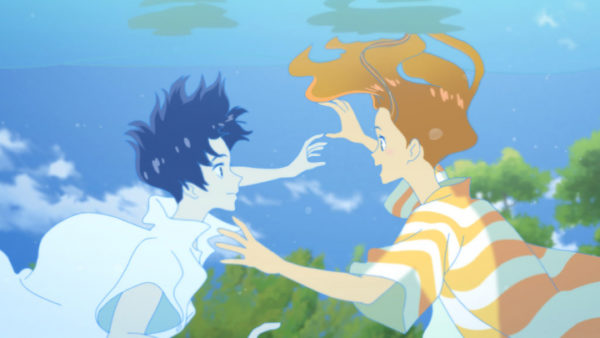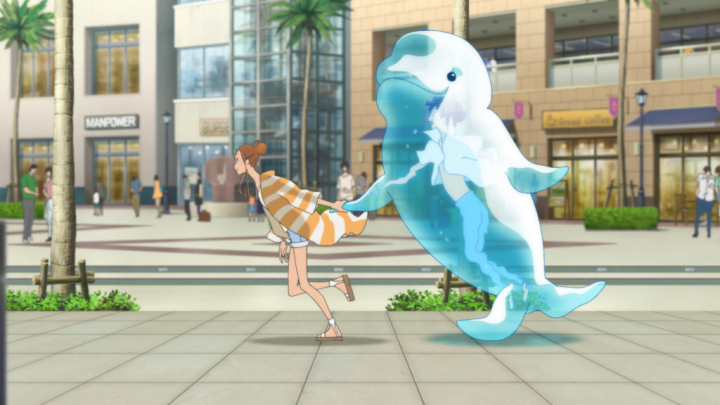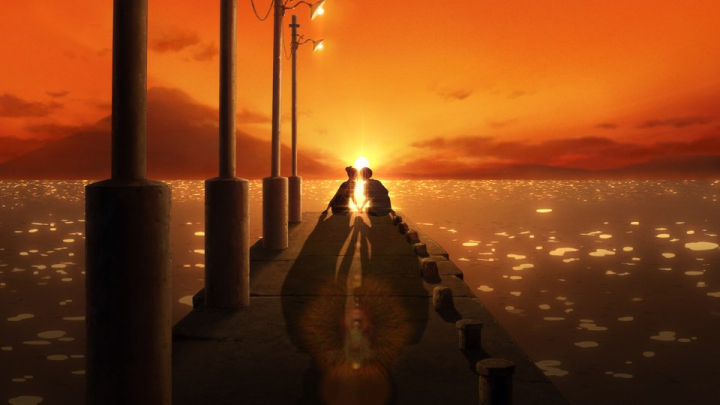
After a string of TV shows, including Netflix’s morbid Devilman Crybaby, Japanese animator Masaaki Yuasa has returned to the sea, following the whimsical Little Mermaid homage Lu Over the Wall with the equally silly and sweet Ride Your Wave. Again he highlights the spiritual connection between water and human life. Reuniting with screenwriter Reiko Yoshida and composer Michiru Oshima, the increasingly busy director here feels like he’s doing a reset. It’s a gentle film that’s reassuring despite its somber introspection, and no less exuberant than his usual work, with fluid and free-moving animation.
Where Lu worked in the template of a fairy tale, Ride Your Wave takes inspiration from modern ones — American rom-coms of the early 2000s. (P.S. I Love You in particular comes to mind.) It’s the story of a star-crossed romance between surfer college student Hinako (voiced by Rina Kawaei) and firefighter Minato (Ryota Katayose). Their relationship is tragically cut short when Minato loses his life in an accident at sea. Hinako, finding it difficult to process the loss, discovers that Minato will appear to her in random bodies of water whenever she sings their song (the infectious theme “Brand New Story”).

This bouncy and catchy pop tune becomes a powerful vector to explore how art and memory intertwine. Where before Hinako carried memories of Minato wherever she went, she now does it literally, holding his watery ghost inside everything from a clear flask to an inflatable whale toy. Both Hinako and Minato are in a state of limbo, and while it’s a balm for Hinako, she’s shutting herself off from feeling and processing her loss — reflected in the non-corporeal Minato’s inability to touch anything. The silliness of the script is gradually revealed as part of this fantastical coping mechanism. Eventually the film unpacks Hinako’s delusion that things can remain as they were.
Masaaki’s animation, while still beautiful, is perhaps the least abstract it’s ever been here, focusing on realistic details (such as Hinako’s clumsiness when making her breakfast) instead of magical flights of fancy. That said, Ride Your Wave still delights in creating impossible movements, with dynamic storyboarding that has the “camera” move through spaces in ways that hand-drawn animation often doesn’t. This culminates in a spectacular, satisfyingly indulgent surfing climax.
Ride Your Wave’s central metaphor is often didactic, with the film repeatedly hammering it home. But that feels appropriate, since it’s an encouragement to the viewer to cope with their own changes — as Minato puts it, “riding the waves.” It certainly helps that, as always, Yuasa’s animation is a delight to watch, free and exuberant. Despite the somewhat morbid premise, it’s a comforting and serene approach to loss, Yuasa illustrating it with his usual mixture of glee and strangeness.

Ride Your Wave opens in theaters today.





Recent Comments